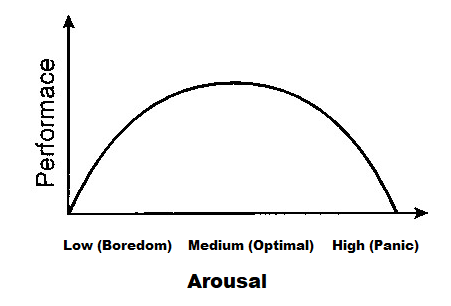Mental Preparation
Mental preparation is integral to athletic success, enabling athletes to manage arousal levels, enhance focus, and optimise performance quality. Through techniques such as visualisation, mental rehearsal, breathing control, and positive self-talk, athletes can cultivate a resilient and focused mind set, leading to improved participation and achievement in sports. Understanding the principles of mental preparation empowers athletes to maximise their potential and perform at their best consistently.
Arousal - The Inverted 'U' Theory:

The inverted 'U' theory illustrates the relationship between arousal (state of physiological and psychological activation) and performance.
According to the theory, performance improves with increased arousal up to an optimal point, beyond which further arousal leads to performance decline.
Changes in Arousal:
Athletes experience fluctuations in arousal levels based on various factors such as game importance, opponent strength, and personal circumstances.
Understanding how to modulate arousal levels to reach the optimal state is crucial for consistent performance.
Visualisation and Mental Rehearsal - Why Does It Help?
Imagery: Mental visualisation of performing a skill or achieving a desired outcome.
Mental Rehearsal: Mentally practicing the sequence of actions involved in a skill.
Visualisation and mental rehearsal help by:
Enhancing concentration and focus.
Building confidence and self-belief.
Improving motor skills through neural activation.
Creating an image involves:
Engaging multiple senses (sight, sound, touch, etc.).
Incorporating details such as environment, movements, and sensations.
Preparation Techniques - Breathing Control and Self-Talk:
Breathing Control: Utilising deep breathing techniques to manage arousal levels and promote relaxation.
Inhale deeply through the nose, hold for a few seconds, and exhale slowly through the mouth.
Helps regulate heart rate and calm the nervous system.
Self-Talk: Positive self-talk involves using encouraging and affirming statements to boost confidence and focus.
Examples include "I can do this," "Stay focused," or "Keep pushing."
Athletes must harness their mental capabilities alongside physical prowess to excel in sports. Mental techniques aid in emotion regulation, stress management, and enhancing performance quality.
